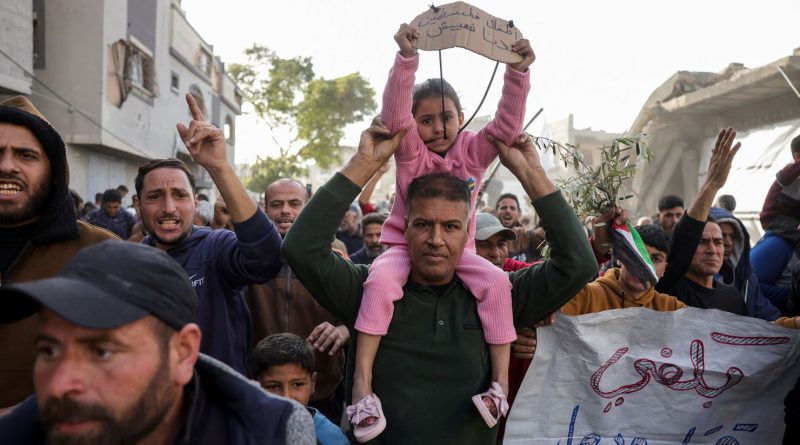Gaza’s Protests Against Hamas: A Cry for Justice and Humanity Amid War and Hardship
The protests in Gaza are more than just a reaction to immediate hardships; they are a plea for recognition.
The recent public demonstrations in Gaza have surprised many observers worldwide. For over 16 months, Gazans have endured relentless Israeli airstrikes, devastation, and an ongoing humanitarian catastrophe. Throughout this period, they have been lauded for their resilience and sacrifice. However, this week’s protests reveal a different side of Gaza’s reality—one that underscores the human need for dignity, justice, and relief from suffering.
The people of Gaza have become synonymous with resistance. Their ability to endure unspeakable hardship has turned them into symbols of perseverance. But as Daoud Kuttab, the award-winning Palestinian journalist, rightly points out, they are human, not superhuman. They feel pain, grieve for their loved ones, and grow frustrated when faced with endless injustice and global indifference. The latest protests are an expression of that frustration—a desperate call for attention to their plight.
The Breaking Point: Renewed Violence and Desperation
The situation in Gaza had seen a glimmer of hope in January when a long-overdue ceasefire was finally implemented. Displaced families began making their way back north, only to find their homes in ruins. With limited resources, they started clearing debris, hoping for the arrival of heavy machinery to remove the rubble and recover the bodies still trapped beneath. But just as they were attempting to rebuild their shattered lives, the ceasefire was abruptly shattered by an Israeli airstrike that killed 400 Palestinians, many of them women and children.
Israel justified the attack by claiming it targeted mid-level Hamas leaders. However, this massive escalation did more than eliminate specific individuals—it reignited a war that had already left Gaza on the brink of collapse. Many Palestinians had placed their faith in the U.S.-brokered ceasefire, expecting some degree of enforcement from the American administration. Instead, Washington chose silence, failing to hold Israel accountable for violating the agreement.
The attack was followed by an intensified blockade on humanitarian aid, leaving Gaza’s already-starving population in an even more dire situation. The Jordanian airdrops of food and medical supplies—though symbolic—failed to provide meaningful relief. As hunger and despair deepened, Gazans found themselves facing a cruel reality: neither the ceasefire nor the promises of humanitarian intervention could protect them.
A Response to Betrayal and Neglect
The frustration that erupted in the form of protests was not merely directed at Israel but also at Hamas. The people of Gaza expect their leaders to navigate crises with strategy and pragmatism, not just ideological steadfastness. In Beit Lahia, when Hamas fired a single symbolic rocket in response to Israeli violations, the Israeli military responded with overwhelming force, once again forcing civilians to evacuate their homes.
This cycle of suffering has tested the patience of even the most steadfast supporters of the resistance. For many Palestinians, the inability of Hamas to negotiate effectively or anticipate Israeli retaliations has become a source of anger. The protesters in Gaza were not only condemning Israeli aggression but also demanding that their leadership show better judgment in a conflict where the balance of power remains overwhelmingly against them.
Attempts to dismiss the protests as externally orchestrated—whether by Mohammed Dahlan’s faction or the Ramallah-based Palestinian Authority—were quickly refuted by community leaders in Beit Lahia. These demonstrations were an organic expression of the people’s anger, not the result of political manipulation.
A Call for Immediate Action
Despite growing discontent with Hamas, the protests should not be misinterpreted as a rejection of Palestinian resistance. Rather, they reflect the urgency of a more strategic approach—one that recognizes the evolving geopolitical landscape. The recent shifts in Washington, Beirut, and beyond necessitate careful recalibration. While Palestinian resilience remains unshaken, the need for diplomatic maneuvering is becoming ever more apparent.
The ceasefire must be reinstated immediately. This is not just a demand for temporary relief but a necessity for survival. The ongoing blockade of food and medical supplies is a blatant war crime, and its continuation only serves to deepen Gaza’s humanitarian crisis. International law explicitly prohibits the use of starvation as a weapon of war, yet the global community has failed to enforce these laws when it comes to Israel’s actions in Gaza.
A comprehensive political process must follow the ceasefire. The reconstruction of Gaza is essential, but it cannot happen in a vacuum. Any meaningful rebuilding effort must be accompanied by a serious peace initiative—one that includes the release of prisoners, restoration of basic human rights, and an end to the indiscriminate targeting of civilians.
Will the World Listen?
The protests in Gaza are more than just a reaction to immediate hardships; they are a plea for recognition. Palestinians are not just statistics in an ongoing conflict—they are human beings with emotions, aspirations, and the right to live in dignity. Their suffering has been met with indifference for far too long. It is time for the world to listen.
Arab nations must take a stronger stand. While public outrage in the region remains high, political action has been lacking. Diplomatic pressure on Israel must be increased, and unconditional support for its war policies must be challenged. The international community, too, must move beyond empty statements and push for tangible accountability.
The cries from Gaza should not be ignored. They serve as a stark reminder that this war is not just about military strategies or political power plays—it is about real lives being lost, real families being destroyed, and real suffering that must end. The time for action is now, before more innocent lives are lost to a conflict that has already claimed too many.



